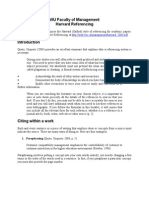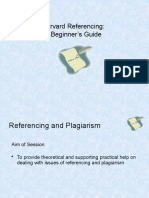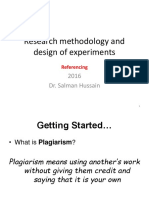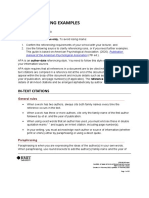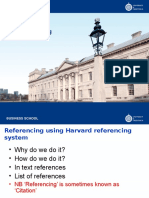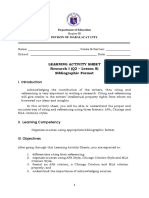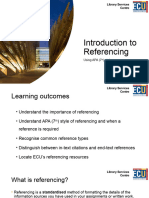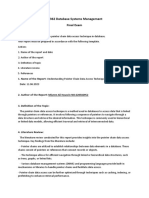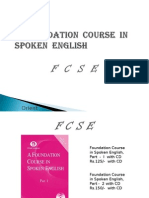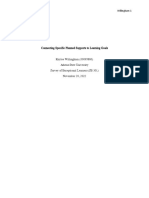What is Citation and Referencing?
Page 1 of 1
When you write your assignments or dissertation, you are
required to refer to the work of other authors. Each time you
do so, it is necessary to identify their work by making
reference to it, both in the text of your assignment (called
'citation') and in a list at the end of your assignment (called a
'reference list'). This practice of acknowledging authors is
known as 'referencing'.
What is the purpose of citing and referencing?
Citing and referencing has a double purpose:
z Avoiding plagiarism.
z Helping readers to get directly to the source of information.
References must be provided whenever you use someone else's opinions,
theories, data, or organisation of material. You need to reference
information from books, articles, videos, web sites, images,
computers, and any other print or electronic sources.
https://elearning.uol.ohecampus.com/webapps/blackboard/content/learningUnitItem.jsp?c... 01/05/2010
�When is Citation and Referencing required? Page 1 of 1
A reference is required if you:
Paraphrase / Summarise
(use someone else's ideas in your own Copy
Quote
words / (use someone else's figures, tables
(use someone else's exact words)
use a brief account of someone else's structure)
ideas)
https://elearning.uol.ohecampus.com/webapps/blackboard/content/learningUnitItem.jsp?c... 01/05/2010
�How to reference using the Harvard System Page 1 of 1
The Harvard System is an established method of referencing and has
advantages of flexibility, simplicity, clarity, and ease of use both for author and
reader. There are two parts to referencing using the Harvard System:
z Citing in the text of your work: This means acknowledging, within your
text (assignment), the sources that you have used.
z Full bibliographic citations: These are the details of the sources you
have used. You list them in alphabetical order at the end of your work. This
is your reference list.
How does a reference list work?
A reference list consists of bibliographical references given at the end of your
text. It should be sufficiently detailed to fully identify the publications referred to in
the text.
The first two parts of the reference - the authors surname and the date - provide
the link to the citation you made in the text.
A reference list with all of the sources you have cited appears at the end of your
work, with the citations listed in alphabetical order of the author's surname.
https://elearning.uol.ohecampus.com/webapps/blackboard/content/learningUnitItem.jsp?c... 01/05/2010
�Citing in the text of your work - Quote Page 1 of 1
When you refer to another document, you must acknowledge this within the text of your work by
citing the author's surname and the date of publication, and where appropriate and available,
the page number.
For example:
Chang (2003, p.77) stated that "Korean companies have been traditionally
characterized by long-term contracts and seniority-based management".
OR
"Despite the fact that advanced computer technology, including
Client/Server and distributed-object computing, and Internet/WEB
technology, provides reliable and relevant mechanisms and tools for
Product Data Management in the large, companies still deal with intricate
and non flexible corporate information systems" (Zarli & Richaud, 1999,
p.2), therefore you will find that…
https://elearning.uol.ohecampus.com/webapps/blackboard/content/learningUnitItem.jsp?c... 01/05/2010
�Citing in the text of your work – Summarise and Paraphrase Page 1 of 1
When you draw ideas from a research source, you do not always have to quote directly to make
use of the concepts. Sometimes, it helps to communicate the idea in a different way that blends
with your own answer. This is called 'paraphrasing' and you still need to show that it is another
person's idea by citing it properly, such as what is shown in the example below.
Original version
"The 80/20 Principle asserts that there is an inbuilt imbalance between inputs and outputs,
causes and consequences, and effort and result. It states that a minority of causes, inputs or
effort usually lead to a majority of the result, outputs or rewards. A few things are important; most
are not. […] To achieve progress and multiply your output, you must give power to the 20% of
resources that really matter in terms of achievement, and get the remaining 80% up to a
reasonable level." (Kotelnikov, V., n.d.).
Paraphrased version
In the view of Kotelnikov, the 80/20 rule is based on an
intrinsic imbalance of inputs and outputs. Essentially, a
few causes or inputs lead to the majority of the results or
outputs in a given situation. This means that most inputs
are not important and that to increase your output, you
need to focus on the 20% of inputs that really matter.
https://elearning.uol.ohecampus.com/webapps/blackboard/content/learningUnitItem.jsp?c... 01/05/2010
�Citing in the text of your work – Exceptions Page 1 of 1
How to cite works which have
no obvious author
If possible, try to avoid citing works where the author is not obvious. If you do need
to cite a work that appears to have no author, use the abbreviation Anon (for
Anonymous).
However, if it is a reference to newspapers where no author is given, the name of
the paper can be used in place of the author or Anon, whichever seems most
helpful. You will need to use the same style in the reference list so the name of the
newspaper may be more helpful.
For example:
The Times (2007) stated that…
How to cite works with
no publication date
If there is no obvious publication date in the work you want to reference, use the
abbreviation n.d. to denote this.
For example:
Morris (n.d.) has argued that…
In your reference list, the publication would be listed as:
Morris, D. (n.d.) History of Business. London: Business Press.
https://elearning.uol.ohecampus.com/webapps/blackboard/content/learningUnitItem.jsp?c... 01/05/2010
�Full bibliographic citations (Reference List) - Books Page 1 of 1
Books
For example:
Lugar, G.F. (2001) Artificial Intelligence: Structures and Strategies for
Complex Problem Solving. 4th ed. Boston: Addison Wesley.
Electronic Books
For example:
Shea, D. & Holzschlag, M.E. (2005) The Zen of CSS Design: Visual
Enlightenment for the Web, Safari Tech Books Online [Online].
Available from:
http://proquestcombo.safaribooksonline.com/0321303474/ch01lev2sec4
(Accessed: 18 April 2006).
Chapters in books
When citing a contribution to a book or a paper given at a conference, you must
reference the surname of the author who made that contribution and the title of that
contribution.
For example:
Hilario, M. (2000) 'Architecture and Techniques for Knowledge-based
Neurocomputing'. In: Cloete, I. & Zurada, J. (ed.). Knowledge-based
Neurocomputing. London: MIT Press, pp.27-52.
https://elearning.uol.ohecampus.com/webapps/blackboard/content/learningUnitItem.jsp?c... 01/05/2010
�Full bibliographic citations (Reference List) - Journals Page 1 of 1
Journal articles
(accessed in hard copy format)
For example:
Chang, E. (2003) 'Composite Effects of Extrinsic Motivation
on Work Effort: Case of Korean Employees', Journal of World
Business, 38 (1), February, pp.70-79.
Journal articles in internet journals
In a reference to an e-journal article from a journal that is only published on the
internet, with no printed issue available, you should include the following
information, in this order:
For example:
Zarli, A. & Richaud, O. (1999) 'Requirements and technology
integration for IT-based business-oriented frameworks in
building and construction', Electronic Journal of Information
Technology in Construction, no. 4, December [Online].
Available from: http://www.itcon.org/1999/4 (Accessed: 21 May
2004).
https://elearning.uol.ohecampus.com/webapps/blackboard/content/learningUnitItem.jsp?c... 01/05/2010
�Full bibliographic citations (Reference List) – Online resources Page 1 of 1
WWW documents /
URLs (Uniform resource
locator/internet address)
For example:
Pears, R. & Shields, G. (1995) Cite Them Right: Referencing
Made Easy [Online] Northumbria: Northumbria University.
Available from:
http://www.unn.ac.uk/central/isd/cite/index.htm (Accessed: 21
May 2004).
OR
Financial Services Authority (2005) What We Do [Online]. Available from:
http://www.fsa.gov.uk/Pages/About/What/index.shtml (Accessed: 2 February
2006).
Online images
For example:
University of Liverpool (2004) University of Liverpool crest
[Online image]. Available from:
http://www.liv.ac.uk/images/logo.gif (Accessed: 20 May 2004).
https://elearning.uol.ohecampus.com/webapps/blackboard/content/learningUnitItem.jsp?c... 01/05/2010
�Full bibliographic citations (Reference List) – Classroom Lectures Page 1 of 1
Information from University of
Liverpool/
Laureate online modules
For example:
University of Liverpool/Laureate Online Education (2007).
Lecture notes from Managing People Module Seminar 4 [Online].
Available from: University of Liverpool/Laureate Online
Education VLE (Accessed: 28 February 2007).
Hint: This is very important as you are likely to reference classroom lectures
often.
https://elearning.uol.ohecampus.com/webapps/blackboard/content/learningUnitItem.jsp?c... 01/05/2010
�Example of a reference list Page 1 of 1
The reference list lists all of the sources you have cited and appears at the end
of your work. The citations should be listed in alphabetical order of the author's
family name.
For example:
Chang, E. (2003) 'Composite Effects of Extrinsic Motivation on Work
Effort: Case of Korean Employees', Journal of World Business, 38 (1),
February, pp.70-79.
Fedchak, E. & Duvall, L. (1996) 'An engineering approach to electronic
publishing', Proceedings of the International Workshop on Multimedia
Software Development, 25-26 March, Berlin. Los Alamitos, California: IEEE
Computer Society Press, pp.80-88.
Financial Services Authority (2005). What We Do [Online]. Available from:
http://www.fsa.gov.uk/Pages/About/What/index.shtml (Accessed: 2 February
2006).
Harris, A., Robinson, K., Smith, P. & Turner, G. (2006) Management Skills.
Oxford: Oxford University Press.
University of Liverpool (2004) University of Liverpool crest [Online
image]. Available from: http://www.liv.ac.uk/images/logo.gif (Accessed: 20
June 2007).
University of Liverpool/Laureate Online Education (2007). Lecture notes
from Managing People Module Seminar 4 [Online]. Available from: University
of Liverpool/Laureate Online Education VLE (Accessed: 28 February 2007).
Williams, A. (2004a) Survey of Living Standards in the Coastal Regions.
London: Survey Press.
Williams, A. (2004b) Employment Figures for the Coastal Regions. London:
Survey Press.
https://elearning.uol.ohecampus.com/webapps/blackboard/content/learningUnitItem.jsp?c... 01/05/2010



















